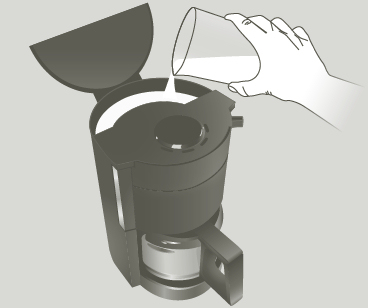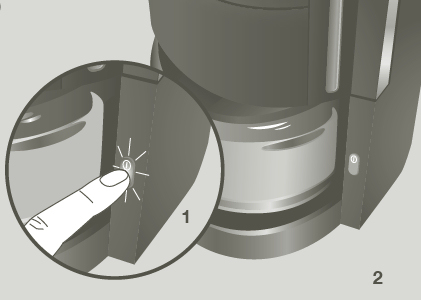Essentials

Description
FASTER BREWING FOR UNRIVALLED CONVENIENCE
Start your day right with a great cup of coffee through the Turbo function, which produces a 35% faster* brewing cycle. SAVOY Turbo is a reliable drip coffee maker that you and your family can use every morning to quickly prepare up to 12 cups of coffee. With functions including regular/bold brew selection, SAVOY guarantees rich, aromatic coffee bursting with flavor every time. The keep-warm function with adjustable time and temperature lets you enjoy coffee at the optimal temperature for up to four hours. Rounding it all off is an intuitive one-touch button for easy use by the entire family. *Comparison between the TURBO REG function and the BOLD function
Turbo functions brews coffee up to 35% faster
Specifications
| Number of Cups | 12
|
| Timer | Dual Auto-on
|
| Carafe | Glass
|
| Coffee aroma | Bold function
|
| Permanent filter | YES
|
| Maximum coffee quantity | 60
oz |
| O/I switch (lighted/Unlighted) | Lighted
|
| Keep warm |
|
| Keep warm adjustable timing |
|
| Keep warm adjustable temperature |
|
| Auto-off - Shut-off |
|
| 1-4 cups |
|
| Removable filter holder |
|
| Coffee Dripping | Pause & Serve
|
| Voltage | 120
V |
| Frequency | 60
Hz |
| Power | 1360
W |
| Price | $79.97
|
Accessories

FAQ
Never put your jug or insulated pot in the microwave oven, dishwasher or on a hotplate.
You can use a paper filter or permanent filter (nylon or metal). These two types of filter are sold in stores.
Operate your filter coffee maker for the first time without any coffee and with the equivalent of one jug of water to rinse it.
The hotplate is used to keep the coffee at the required temperature while leaving the coffee maker switched on. This function is available only with coffee makers that come with a glass pot.
Tap water (normal household potable water) is perfectly OK as long as it is free of odors that might alter the taste of the beverage. Bottled water is also OK.
Do not use refrigerated or warm water as this might impact the temperature of the beverage.
Use always fresh water and replace the water if system has not been used for more than 2 days.
For cold beverages, use water at ambient temperature, never refrigerated water, and place two or more ice cubes (20g per ice cube) in the cup.
To be noticed that water hardness is the first reason of machine calcification and so it is recommended to descale the machine frequently (every 3months or less according to water hardness).
Do not use refrigerated or warm water as this might impact the temperature of the beverage.
Use always fresh water and replace the water if system has not been used for more than 2 days.
For cold beverages, use water at ambient temperature, never refrigerated water, and place two or more ice cubes (20g per ice cube) in the cup.
To be noticed that water hardness is the first reason of machine calcification and so it is recommended to descale the machine frequently (every 3months or less according to water hardness).
Depending your appliance model, you can buy it from an after sales service or from the "Accessories" section of the website.
Scale deposits naturally form in your coffee maker. Regular descaling helps protect your coffee maker and ensures it a longer life. It will also help maintain a quality of coffee that remains constant over time.
Use the descaling kit or some white vinegar:
• Use some descaling solution diluted in half a litre of water or use 25cl of white vinegar in half a litre of water.
• Pour the solution into the water tank (without coffee),

• Start the cycle (without any coffee). After 2 minutes, stop the cycle manually. Leave the coffee maker for an hour,

• Restart the coffee maker to finish the cycle,

• To rinse the machine, run 2 cycles with water but without coffee.

Repeat the complete descaling operation, if necessary.
• Use some descaling solution diluted in half a litre of water or use 25cl of white vinegar in half a litre of water.
• Pour the solution into the water tank (without coffee),

• Start the cycle (without any coffee). After 2 minutes, stop the cycle manually. Leave the coffee maker for an hour,

• Restart the coffee maker to finish the cycle,

• To rinse the machine, run 2 cycles with water but without coffee.

Repeat the complete descaling operation, if necessary.
How often you descale your coffee maker depends on the hardness of the water and on how often you use your coffee maker. The following are tell-tell signs of scaling: the coffee making cycle takes longer, the appliance produces lots of steam, makes much more noise at the end of the cycle or stops during the cycle, this means that scale has built up in your coffee maker. You should descale your coffee maker between every 20 to 40 cycles or once a month depending on the hardness of the water.
Insulated carafes should never be put into the dishwasher!
A plastic insulated carafe should be rinsed under hot water immediately after use.
Never clean the carafe with a dishwashing brush or any other object as this may create hairline cracks that can cause the glass to implode. A brushed steel insulated carafe can easily be cleaned with a dishwashing brush or similar object, even inside.
A plastic insulated carafe should be rinsed under hot water immediately after use.
Never clean the carafe with a dishwashing brush or any other object as this may create hairline cracks that can cause the glass to implode. A brushed steel insulated carafe can easily be cleaned with a dishwashing brush or similar object, even inside.
The glass coffee pot and the filter receptacle must be washed in the upper rack of the dishwasher.
• The quantity of ground coffee is too large. We recommend using one measure of coffee (7 grams) per mug.
• The ground coffee is too fine ('Espresso' type ground coffee).
• If you use a permanent filter, do not use a paper filter as well.
• Certain types of paper filter (to make full-bodied coffees) can prolong the time in which it takes for the water to pass through the filter and ultimately cause the water to overflow.
• The ground coffee is too fine ('Espresso' type ground coffee).
• If you use a permanent filter, do not use a paper filter as well.
• Certain types of paper filter (to make full-bodied coffees) can prolong the time in which it takes for the water to pass through the filter and ultimately cause the water to overflow.
The coffee maker is lined with scale. You should descale it.
In the event of a power cut, it may be necessary to press the On/Off button again.
On models with a timer, the clock must be programmed.
On models with a timer, the clock must be programmed.
Clean the anti-drip valve of the filter holder under running water, activating it manually.
Do not use your appliance. To avoid any danger, have it replaced by an approved repair centre.
This is entirely dependent on taste: you can buy pre-ground coffee for filter machines from supermarkets in a variety of strengths and flavours, you can grind your own coffee beans or you can buy beans at a coffee shop and ask for them to be ground to filter consistency.
Always keep ground coffee in an airtight container or seal the pack with a bag clip. Keep the container in the fridge to prolong freshness.
Medium to fine ground (but not too fine). You can also ask for "Espresso ground".
The inner circuits scale up, water doesn't flow through properly, and flows much slower.
The warranty excludes failures due to a lack of regular descaling.
The warranty excludes failures due to a lack of regular descaling.
Your appliance contains valuable materials which can be recovered or recycled. Leave it at a local civic waste collection point.
If you believe that one part is missing, please call Consumer Services Center and we will help you find a suitable solution.
Please go to the “Accessories” section of the website to easily find whatever you need for your product.
Find more detailed information in the Warranty section of the website.
Product Reviews
You may also like
Recently Viewed




